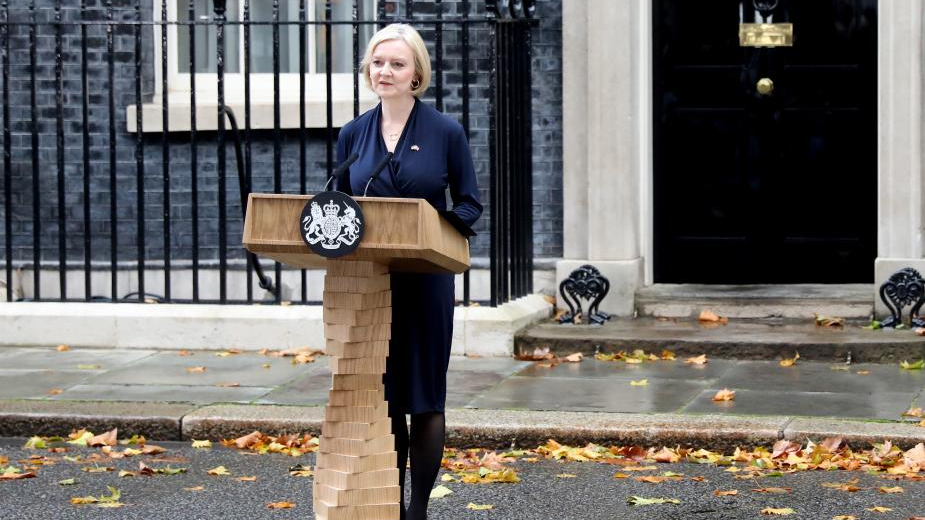
British Prime Minister Liz Truss makes a statement outside 10 Downing Street in London, Britain, October 20, 2022. [Photo/Xinhua]
By Freddie Reidy
The word "unprecedented" featured everywhere during the peak of the COVID-19 pandemic, and it would likely have left the British lexicon were it not for the political tumult the UK is now facing.
After just 45 days in the job, UK Prime Minister Liz Truss was forced to resign, having seen her entire political agenda implode within days. The Conservative Party is now on course to find her successor by Friday, October 28.
Albert Einstein is quoted as saying that "insanity is doing the same thing over and over again and expecting different results." By this definition the Conservative Party has lost its reason. Squabbling over Brexit ended the premierships of David Cameron and Theresa May and the subsequent ideological entrenchment precipitated the departure of Boris Johnson and Liz Truss herself.
Most political parties in the United Kingdom represent a broad church, but the Conservative Party has prized ideology over pragmatism, over party unity and now seemingly over its electoral prospects.
The Tories, as they are also known, had enjoyed a reputation for stability and fiscal credibility reflected in electoral victories at the ballot box in every general election since 1979 with the exception of three election defeats to Tony Blair between 1997 and 2005. That reputation has now been severely tarnished.
The response to the resignation of Truss has not given way to party pragmatism though, but a retreat to the ousted and defeated leaders of the past. Former Chancellor of the Exchequer Rishi Sunak, who was defeated by Truss in the last leadership election leads the pack; but not only did he lose, but many colleagues hold Sunak responsible for Boris Johnson's Ceasar-style departure.
Johnson himself is said to be considering a comeback having only stood down in September. Leader of the House of Commons Penny Mordaunt is the most convincing unity candidate with allies on both wings of the party, but is something of an outside bet.
Whoever succeeds Truss, though, must secure the confidence of MPs in the House as well as the markets, before going to the country. Truss secured neither. It is likely, therefore, with the markets as a bellwether, that some pragmatism may be enforced with current Chancellor of the Exchequer Jeremy Hunt remaining in post. Hunt was drafted in to stabilize the ship after the calamitous "mini budget," which saw his predecessor dismissed along with Truss's economic platform.

Newly appointed UK Chancellor of the Exchequer Jeremy Hunt leaves 10 Downing Street in London, Britain, October 14, 2022. [Photo/Xinhua]
The Chancellor's calm and matter-of-fact delivery did help to settle nerves in the city, and also those in parliament, even if his message was grim. Politics is usually the preserve of the "Westminster village" but such is the scale of upheaval that the entire country appears in a frenzy.
Turmoil has become the new normal and bad news is delivered with zeal and fervor by the baying press, as fuel is poured on the fire by mischievous journalists persistently citing unattributed sources to stir the pot.
Liberal leader David Steel once ill-fatedly told his party to "go back to your constituencies and prepare for government." The message from party grandees must therefore be, "coalesce around the victor" or else "go back to your constituencies and prepare for opposition."
According to recent polling, were an election to be held now, the Conservative Party would face a wipe out, becoming the third largest party in the country and losing 317 seats. Such an outcome is of course improbable, but the prospect of an opposition landslide is still a likely one.
To avoid this electoral oblivion, whoever succeeds the prime minister must abandon factionalism and build a legislative agenda that capitalizes on the areas of consensus, and momentum has to be built steadily.
For now, the only barometer worthy of attention is the markets and strength of the pound. Until these vitals reflect strength and resilience, political polls are meaningless. After all, "it's the economy stupid!" If a recovery is under way come the 2024 general election, then it's all to play for. But whether Conservative MPs are given to such clear logic remains to be seen.
Freddie Reidy is a freelance writer based in London. He studied history and history of art at the University of Kent, Canterbury, specializing in Russian history and international politics.

 中文
中文



